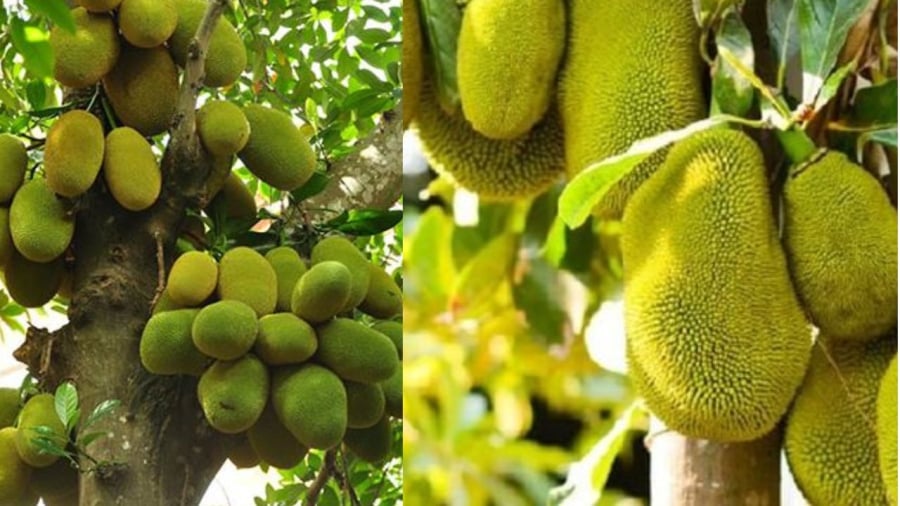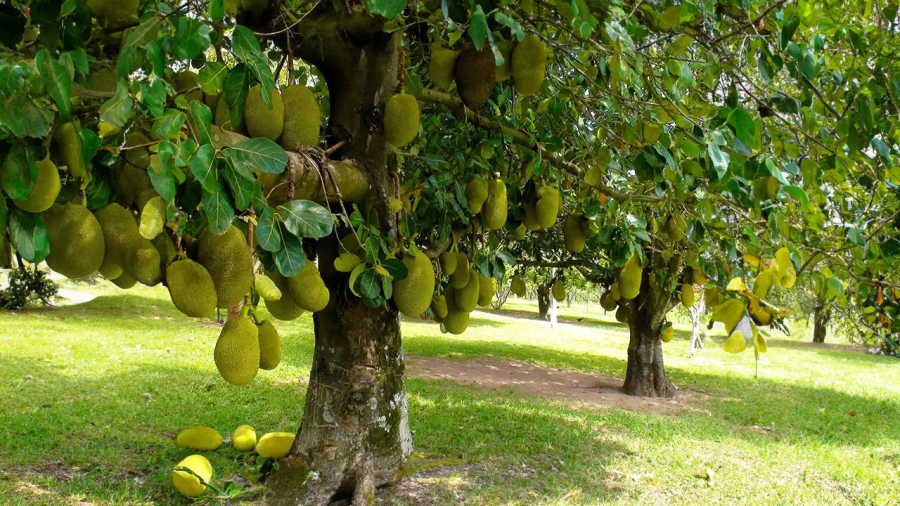Jackfruit Wood: A Versatile Tree with a Rich History
Jackfruit Wood for Temple Statues
The jackfruit tree is a versatile plant with multiple uses. Its fruit is sweet and delicious, and its value surpasses that of many other fruits. The leaves are used medicinally, and the wood is highly regarded for its durability and resistance to termites.
Traditionally, jackfruit wood was chosen for crafting temple statues. Its leaves were also used as spoons for offering food to the hungry ghosts. The wood’s beauty, strength, and natural resistance to termites, cracking, and warping made it ideal for creating religious statues. Compared to other types of wood, jackfruit wood was often used for household items such as chopping boards and tables.

The Beauty of Jackfruit Wood and Fruit
Why Ancestors Avoided Planting Jackfruit Trees in Front of Houses
The jackfruit tree is a long-lived, tall tree that bears abundant fruit. However, from a feng shui perspective, planting a jackfruit tree in front of a house is not considered auspicious.
Jackfruit trees are commonly associated with temples, shrines, and religious sites. As a result, they are believed to attract more yin energy, which is not suitable for residential areas. Ancestors often planted jackfruit trees in wastelands, temples, and shrines, avoiding the front of their homes.
Additionally, jackfruit trees were thought to harbor spirits, and planting them close to the house was believed to adversely affect the health of the residents, depleting their yang energy and bringing bad luck to the family.
Moreover, jackfruit trees are large, with rugged trunks and lush foliage that sheds leaves frequently, creating a messy and shaded area in front of the house. From an aesthetic and spiritual perspective, planting jackfruit trees in front of a house is not recommended in feng shui. The massive size of the tree can also obstruct the family’s living space, blocking pathways and views.

Jackfruit Trees Can Obstruct Views and Require Frequent Maintenance
The constant leaf shedding of jackfruit trees can make the front yard messy and require frequent cleaning. Moreover, unripe jackfruits tend to fall and rot quickly, creating an unsightly mess in the yard.
In the past, jackfruit trees were typically planted in temples and community areas, and people did not want to bring those trees associated with religious sites into their homes. The strong energy of the jackfruit tree can be challenging to suppress in a regular home, potentially draining the residents’ yang energy, which is why it is not favored from a feng shui perspective. However, planting jackfruit trees in temples can help balance the energy.
Should We Plant Jackfruit Trees at Home Now?
Jackfruit is a delicious fruit enjoyed by many, and it remains a popular and economically valuable crop. However, due to its size and the space it requires, it is more suitable for larger properties or farms.
Nowadays, people primarily plant jackfruit trees for economic reasons rather than as ornamental plants. It takes a long time to bear fruit, and it needs to be planted in a spacious area to yield a good harvest. For these reasons, not everyone is keen on growing jackfruit trees. They are mostly cultivated on farms and in orchards for commercial purposes.
Today, the aversion to planting jackfruit trees in front of houses is mainly based on practical considerations of space and aesthetics rather than the spiritual beliefs of the past.
In recent years, advanced agricultural techniques have led to the development of smaller jackfruit tree varieties suitable for home gardens. If you wish to grow jackfruit at home, consider either having a large garden to accommodate a full-sized tree or opt for these new dwarf varieties that can be grown in pots. These modern dwarf varieties also bear fruit much faster than their traditional counterparts.
Information provided is for reference only






























